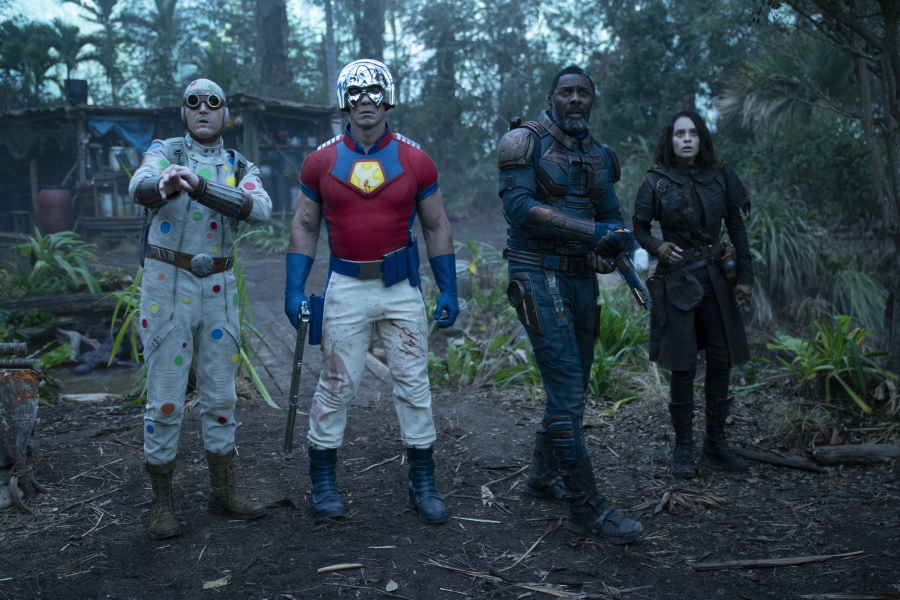ST. LOUIS — A man whose detachable arms can fly through the air to slap the faces of soldiers is helping to save the world from a giant, megalomaniacal starfish, and it’s all because some St. Louis teachers recognized talent when they saw it.
The man with the detachable, self-propelling arms is the Detachable Kid, also known as TDK, one of more than a dozen characters with unusual abilities at the heart of “The Suicide Squad.”
The potential blockbuster, a sequel to the 2016 hit “Suicide Squad,” is written and directed by James Gunn, who grew up in Manchester. Based on a series of DC Comics, it tells the story of a group of hardcore criminals — and anthropomorphic animals — who are recruited out of jail to participate in dangerous missions to save the world from evil.
If they live, they will get 10 years reduced from their prison sentences. If they die, well, no one will miss them.
In one sense, the film’s path to the screen began with Gunn’s education at St. Louis University High School and St. Louis University.
“The guys there, what they taught me, the way they saw something in me, which was some sort of talent artistically, (they) nurtured that and brought that out and had faith in me,” he said by phone from Atlanta.
The Rev. Phil Steele, who taught Gunn art in high school, was among the first to see and nurture his artistic side. Joe Schulte, who taught high school theater, thought enough of Gunn’s acting to have him and a friend perform a two-person, one-act play for the school’s Mothers Club.
At St. Louis University, creative writing teacher Al Montesi encouraged Gunn to write plays. Gunn immediately recognized he had an affinity for drama.
“At the time, I was playing music in bands,” he says. “I was like, ‘Wow, being able to use my brains and tell stories is really exciting.’ I mean, I like performing onstage, but using my brain and having people see my thoughts and turning my thoughts into actual action, and turning my thoughts into words external to myself, that was exciting.”
After earning an MFA from Columbia University, Gunn began working for Troma Studios, a gleefully low-budget film production and distribution company that specializes in humorously cheesy horror and other exploitation films. His first produced script for Troma was “Tromeo and Juliet,” which was set in modern-day New York City (Juliet: “Parting is such sweet sorrow.” Tromeo: “It totally sucks.”)
After several more projects with Troma, Gunn began working with bigger studios and bigger budgets. His first major script was for the popular live-action movie version of “Scooby-Doo” and its sequel. He also wrote the 2004 remake of “Dawn of the Dead,” a zombie film that takes place mostly in a shopping mall.
But he came into his own with “Slither,” a 2006 horror film he both wrote and directed, which reveled in the comedic possibilities of gore. With his massively popular “Guardians of the Galaxy” and “Guardians of the Galaxy, Vol. 2,” he entered a new dimension of filmmaker fame.
DC Comics was so enamored of Gunn’s success, he says, that the company let him make a film of any of its comic-book properties that he liked. DC offered him “Superman,” but he didn’t want to make “Superman.” When he was offered “The Suicide Squad,” he asked what he would have to keep from the first movie.
Nothing, DC said, so he started to think about it, along with two other projects.
“I really wanted it to come from a creative place,” he says.
“I spent about a month playing with different forms. I started writing what became the plot of this movie, and it started to sing. It started to become its own thing. I was very excited about the story of it, and that’s what made me want to do it.”
As Gunn sees it, the movie is a war-caper film, like “The Dirty Dozen,” “Where Eagles Dare” or “Kelly’s Heroes” — movies, often with a lighthearted touch, in which a group of tough soldiers go on a dangerous mission.
“The Suicide Squad,” though, is set in the world of comic books.
“It’s this magical realistic universe of DC, where Batman and Superman are real guys,” Gunn says. “In this world, it’s weird to see a walking shark, but it’s not the same as if it was in (the real world). We’d probably faint if we saw a walking shark in real life. But because of that magical realism, it’s shocking to see one, but it’s not so surprising.”
The unrealistic setting allows the film to indulge in sudden spasms of extreme violence, often — but not always — played for comic effect. More than one body is ripped in half, while another character survives a series of increasingly violent indignities.
“Even in this movie, there is some violence that’s pretty real, and that’s the stuff that’s not funny,” Gunn says.
But much of the violence is so ridiculously excessive that it is clearly meant to induce laughter from the audience.
“I don’t know why it’s funny,” he says. “I wish I knew why it’s funny.”
The mixture of comic violence and horrifying violence is part of the film’s intentionally multifaceted technique. It’s an action film, a drama, a comedy, a war film, science fiction and a conspiracy picture all at the same time. Gunn gives credit for this approach to the movies he loves from Hong Kong, Japan and, more recently, South Korea.
“They don’t look at genre in the same way,” he says. “Here in the United States, we say, ‘This is a comedy or this is an action movie or this is a horror movie or this is a romance.’ They don’t have that same categorization process.
“To take that style of filmmaking and Westernize it is something that I’ve been trying to do for my whole career.”



